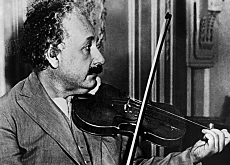
Zurich claims Einstein as prodigious son

The foundations for Albert Einstein's groundbreaking work in physics were laid in Zurich, according to the city's Federal Institute of Technology.
The genius came within a whisker of proving his theory of relativity while at the institute and Zurich planted the seeds of his future radical political beliefs, a month-long exhibition at the institute reveals.
The exhibition, which lasts until October 29, plots Einstein’s association with Zurich, where he studied, gained Swiss citizenship, met his wife and taught at the institute and the city’s university.
Einstein came to Zurich in 1895 aged 16 because the Federal Polytechnic, as the institute was then known, was one of the few universities in Europe that accepted students without a high-school diploma.
Einstein was allowed to take the Polytechnic’s entrance exam despite being two years below the minimum age of acceptance. He failed, but returned a year later to pass and start a course in mathematics and natural sciences.
Wayward
He was known as a gifted but wayward student who preferred to skip classes and study alone. He was turned down for a teaching post at the Polytechnic after achieving only modest results in his final exams in 1900.
“Had I been a professor at the institute at the time, I would have probably turned him away,” Professor Hans Rudolf Ott, the current head of the institute’s physics department, told swissinfo.
“It seems incredible now, but Einstein was a bit of an unknown quantity at that stage of his life and did not get on very well with any type of authority,” he said.
“He was a free thinker, frequently went off on his own to study newfangled theoretical physics rather than follow the Polytechnic’s course and had some weaknesses in mathematics and the humanities.”
Free spirit
Einstein had other interests in Zurich, meeting his future wife Mileva Marić at the Polytechnic and developing some anti-authoritarian political beliefs at the Grand Café Metropol, documents at the exhibition reveal.
“After the outbreak of the First World War, Einstein took the socio-political views he formulated in Zurich a step further and declared himself a citizen of the world,” said Ott.
“He rejected the need for states or any kind of authority. In this respect he was idealistic, but not realistic. He was a free spirit rather than a communist.”
Frustrated by the lack of opportunities, Einstein left Zurich for Bern in 1902, a year after being granted Swiss citizenship by the Zurich city authorities. He was excused military service on the grounds of flat and sweaty feet.
In Bern he found fame in 1905 with his five pioneering papers on physics, but returned to Zurich in 1909 to take up the newly created chair of theoretical physics at Zurich University.
Nutcracker
He was lured back to the Federal Institute of Technology in Zurich, as it is now called, in 1912 to take up a similar position and he started work on his groundbreaking theory of relativity.
“He almost had it while he was at the institute, but he did not quite realise the value of what he had worked out,” said Ott.
“He got very close to the solution, but somehow he went astray before completing it in Berlin. But his time in Zurich was extremely important for finally cracking the nut.”
Einstein left Zurich and Switzerland for good in 1914, but the impact he had on the city has not been forgotten.
“The Federal Institute of Technology is proud to have had him as a student and as a professor,” said Ott.
swissinfo, Matthew Allen in Zurich
In 1896 Einstein started studying at Zurich’s Federal Polytechnic (now the Federal Institute of Technology in Zurich) at the age of 17.
In 1900 he graduated with modest exam results.
Einstein accepted the chair of theoretical physics at Zurich University in 1909 and three years later took a teaching post at the Federal Institute of Technology.

In compliance with the JTI standards
More: SWI swissinfo.ch certified by the Journalism Trust Initiative






























You can find an overview of ongoing debates with our journalists here . Please join us!
If you want to start a conversation about a topic raised in this article or want to report factual errors, email us at english@swissinfo.ch.